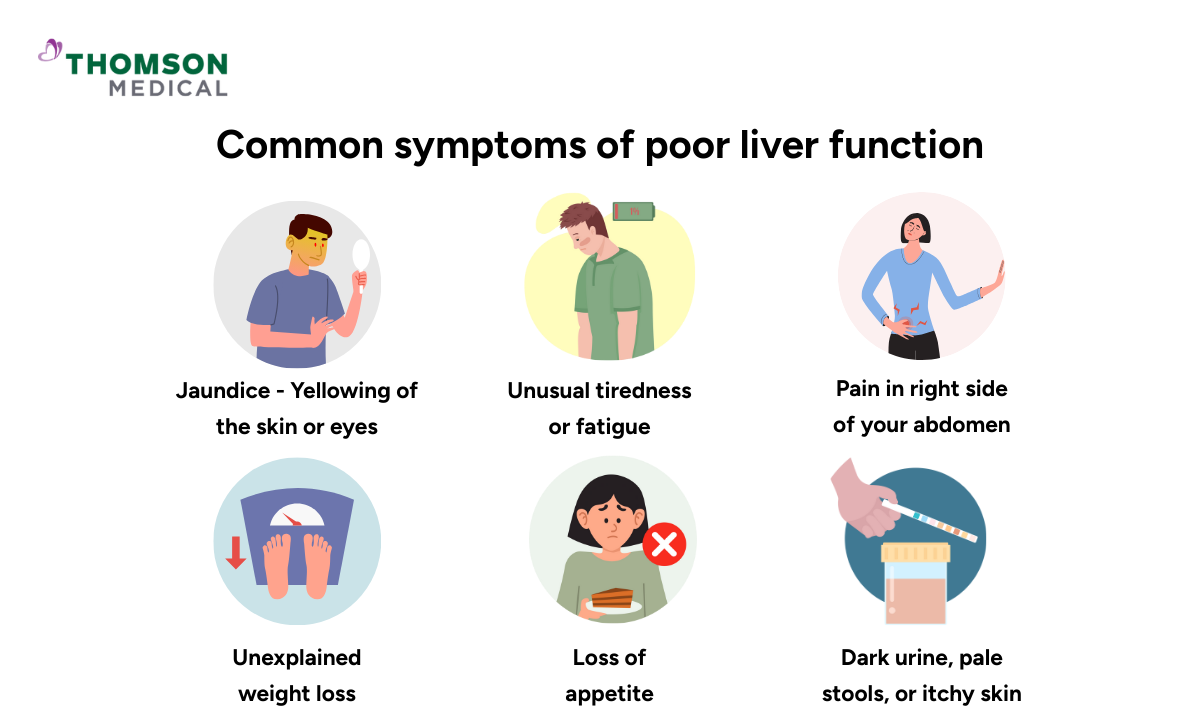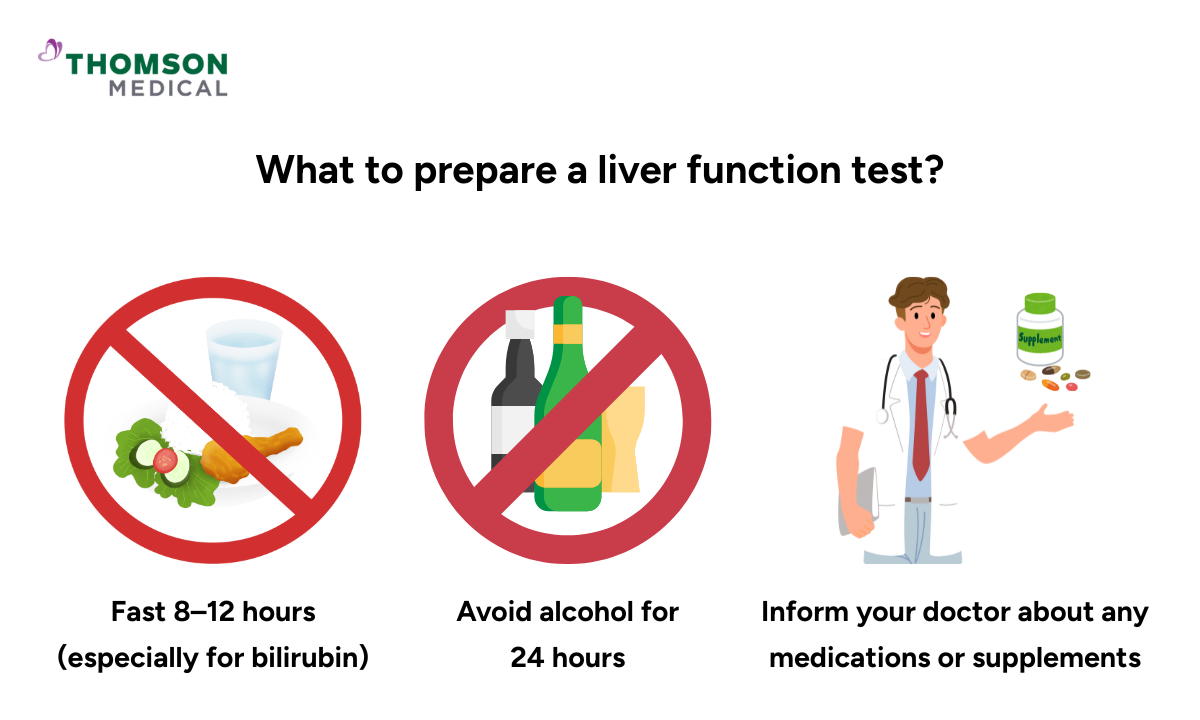What are liver function tests?
Liver function tests (LFTs) are a group of blood tests used to assess how well your liver is working. These tests measure specific enzymes, proteins, and substances that are either produced by the liver or released when liver cells are damaged.
By analysing these levels in your blood, doctors can evaluate your liver’s overall health, detect signs of inflammation or damage, and monitor the progression of liver conditions.
LFTs are commonly used to help diagnose liver diseases such as liver cancer, hepatitis, fatty liver, or cirrhosis and to check how well treatments are working.
Common types of liver function tests
Liver function tests include several individual blood tests, each providing insight into different aspects of liver health. Below are the most common markers measured and what they typically reveal:
Alanine aminotransferase (ALT):
High levels may indicate liver damage or inflammation, such as in hepatitis or fatty liver disease.
Aspartate aminotransferase (AST):
Also linked to liver damage but found in other organs too—usually assessed with ALT.
Alkaline phosphatase (ALP):
Raised levels may signal blocked bile ducts or liver inflammation.
Gamma-glutamyl transferase (GGT):
Often used to detect bile duct issues or alcohol-related liver damage.
Bilirubin:
High bilirubin can cause jaundice - when your skin and eyes turn yellow because there's too much bilirubin in your blood - and may indicate problems with liver function or bile flow.
Albumin:
Low levels can mean poor liver function or nutritional issues.
Prothrombin time (PT):
Measures how long your blood takes to clot; a longer time may suggest liver impairment.
Total protein:
Measures all proteins in your blood, including albumin and globulin; low levels may suggest liver or kidney problems.
If you're unsure which liver function test you need or whether you should get tested, you can always request an appointment with us. We'll guide you through the right tests based on your symptoms and health concerns.
What are liver function tests used for?
LFTs are important tools that help doctors understand how well your liver is working. They can be used for several purposes, such as:
Checking liver health:
LFTs help assess how well your liver is performing its vital functions, such as filtering toxins, producing proteins, and processing nutrients.
Diagnosing liver conditions:
These tests can help detect liver diseases such as hepatitis, fatty liver disease, or cirrhosis early, often before symptoms appear.
Identifying liver damage:
LFTs can reveal if your liver has been harmed by infections, alcohol, medications, or toxic substances.
Monitoring treatment progress:
If you’re already being treated for a liver condition, regular LFTs can help track how well the treatment is working and whether your liver is improving.
Getting a liver function test can help detect issues early — often before symptoms become serious. Request an appointment with Thomson Medical and our specialists can assess your symptoms and guide you on the next steps for protecting your liver health.
Why might you need a liver function test?

If you’re experiencing signs of liver problems
You may need a liver function test if you're experiencing symptoms that could point to a liver problem, for instance:
Yellowing of the skin or eyes (jaundice)
Unusual tiredness or fatigue
Pain or swelling in the upper right side of your abdomen
Dark urine, pale stools, or itchy skin
Loss of appetite or unexplained weight loss
You have risk factors for liver disease
Even if you don’t have symptoms, you may still need liver function testing if you have certain risk factors. These include:
Chronic alcohol use, especially in large amounts
A family or personal history of liver disease, including hepatitis B or C
Use of medications known to affect liver health, such as statins, anti-seizure drugs, or chemotherapy
Exposure to toxins or long-term use of herbal supplements with potential liver effects
Underlying health conditions like type 2 diabetes, high cholesterol, obesity, or metabolic syndrome
You’re undergoing treatment for a liver condition
If you’ve been diagnosed with a liver-related illness (such as hepatitis, fatty liver disease, or cirrhosis), LFTs are often used to:
Track disease progression
Evaluate how well your liver is functioning over time
Monitor how effective your current treatment is
Adjust medication doses if needed
If you’re experiencing symptoms like fatigue, yellowing of the skin, or abdominal discomfort, it’s important to get your liver checked. Request an appointment with us and our specialists will assess your symptoms and risk factors, and recommend the right tests for you.
What happens during a liver function test?
LFT is a straightforward blood test that helps assess your liver health. Here’s what typically happens during the procedure:
A healthcare professional will begin by cleaning the skin on your arm, usually around the inside of your elbow. A small needle is then used to draw a sample of blood from a vein. This process takes just a few minutes and may cause only mild discomfort or a small bruise afterwards.
The blood sample is then sent to a laboratory, where it is tested for several key markers of liver health — including liver enzymes, proteins, and bilirubin levels. These results help doctors assess how well your liver is functioning and whether there may be signs of inflammation, damage, or disease.

Preparation may vary depending on the specific tests your doctor orders. In general, you might need to:
Fast for 8 to 12 hours before the test, especially if your doctor is checking substances like bilirubin
Avoid alcohol for at least 24 hours before the test, as it can affect liver enzyme levels
Inform your doctor of any medications or supplements you’re taking — some drugs can interfere with test results
Remember, always follow your doctor’s instructions carefully to ensure the most accurate results.
What do liver function test results mean?
Here's what different types of results may indicate:
Elevated liver enzyme levels (ALT, AST, ALP, GGT):
Higher-than-normal levels of these enzymes may suggest liver inflammation or damage. This problem could be due to hepatitis, fatty liver disease, alcohol use, or reaction to certain medications.
Low albumin or total protein levels:
These results may indicate chronic liver disease, poor liver function, or malnutrition, as the liver is responsible for producing essential blood proteins.
High bilirubin levels:
An increase in bilirubin can signal bile flow problems, such as a blocked bile duct, or liver conditions like cirrhosis or hepatitis. It’s also commonly linked with jaundice — a yellowing of the skin and eyes.
Worried about your liver test results or unsure what they mean? Request an appointment with us today as our doctors will review your results in detail and recommend the next steps for your liver health.
Price of a liver function test in Singapore
The cost of a liver function test in Singapore typically ranges from S$30 to S$80, depending on the healthcare provider, whether it's a public or private clinic, and if the test is part of a broader health screening package. At government polyclinics or restructured hospitals, subsidised rates may apply for eligible Singaporeans and PRs. In private clinics or specialist centres, prices may be higher but often include faster results and consultation services.
Do note that additional charges may apply for doctor consultations, report reviews, or follow-up testing, so it's best to check with your chosen provider in advance.
The information provided above is intended for general reference only. For detailed fee information and payment options, please consult your healthcare provider directly. Request an appointment with our specialists at Thomson Medical today for a detailed price breakdown and a personalised care plan.
FAQ
What is the normal range for LFT results?
When interpreting liver function test (LFT) results, it’s important to know the normal reference ranges. These values help doctors determine whether your liver is functioning properly. While slight variations may exist between laboratories, the following are generally accepted normal ranges for key liver markers:
ALT: 0-31 U/L
AST: 0-37 U/L
ALP: 35-129 U/L
Bilirubin: 0-17umol/L
Albumin: 38-54g/L
Total protein: 66-87g/L
These reference ranges serve as a guide, but results should always be interpreted in the context of your symptoms, medical history, and other test findings.
Are there any risks to a liver function test?
Liver function tests are very safe and carry minimal risk. The test involves a standard blood draw, which may cause:
Mild discomfort or a slight pinch at the needle site
Bruising or tenderness, which usually fades within a day or two
Rarely, infection or dizziness after the blood draw
These side effects are uncommon and usually resolve quickly. Most people experience no complications.
What does it mean if my liver function test (LFT) results are high?
If the results of your liver function test are high, it may suggest that your liver is inflamed, damaged, or not working as it should. This could be due to a range of conditions, including:
Hepatitis (viral or autoimmune)
Alcoholic liver disease
Non-alcoholic fatty liver disease (NAFLD)
Liver cirrhosis
Side effects from medications or exposure to toxins
In many cases, elevated results don’t mean serious disease but should not be ignored. Your doctor may recommend further testing — such as imaging like a liver ultrasound scan or additional blood work — to find out what’s causing the abnormal results.
What are the signs of poor liver function?
When the liver isn't working properly, it can lead to a range of noticeable symptoms. Common signs of poor liver function include:
Jaundice (yellowing of the skin or eyes)
Dark-coloured urine
Pale or clay-coloured stools
Unexplained tiredness or fatigue
Nausea and vomiting
Abdominal pain or swelling (especially in the upper right side)
Loss of appetite or sudden weight loss
Can a liver function test be wrong?
While LFTs are generally reliable, they can sometimes produce false or misleading results. Certain factors can affect the accuracy of your results, including:
Medications or supplements that interfere with liver enzymes
Recent alcohol consumption
Strenuous exercise before the test
Dehydration or fasting status
Lab variations or sample handling issues
Abnormal results don’t always mean you have liver disease. That’s why doctors often look at your full medical history, symptoms, and additional tests (such as imaging tests or repeat bloodwork) to confirm a diagnosis.
How can I improve my liver function?
Improving liver function depends on what’s causing the issue, but there are several proven steps you can take to support better liver health:
Avoid alcohol:
Even small amounts can worsen liver damage, especially if liver function is already impaired.
Eat a balanced diet:
Focus on fruits, vegetables, whole grains, lean proteins, and healthy fats. Reduce intake of processed foods and added sugars.
Exercise regularly:
Aim for at least 150 minutes of moderate activity per week to help manage weight and reduce fatty deposits in the liver.
Maintain a healthy weight:
Obesity is a major risk factor for non-alcoholic fatty liver disease (NAFLD).
Treat underlying conditions:
Work with your doctor to manage chronic conditions like hepatitis, diabetes, or high cholesterol.
Use medications wisely:
Avoid overuse of over-the-counter drugs like acetaminophen (paracetamol) and stay away from supplements or toxins that may stress the liver.
Therefore, making long-term lifestyle changes is often the most effective way to support liver repair and prevent further damage.
The information provided is intended for general guidance only and should not be considered medical advice. For personalised recommendations and tailored advice, please consult a specialist at Thomson Medical. Request an appointment with Thomson Medical today.
For more information, contact us:
Thomson Specialists Paragon (Health Screening)
- Mon - Fri: 8.30am - 5.30pm
- Sat: 8.30am - 12.30pm
Call: 6735 0300
See Health Screening Packages
Notice:
The range of services and tests may vary. Please contact us directly to enquire about the current availability.
Book Health Screening